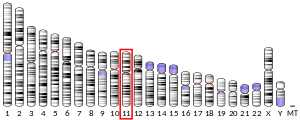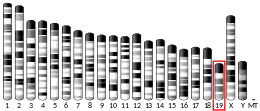Cardiotrophin-like cytokine factor 1 (CLCF1), also known as Novel Neurotrophin-1 (NNT-1) or B cell-stimulating factor-3 (BSF-3), is a protein that in humans is encoded by the CLCF1 gene.[5]
Function
CLCF1 is a cytokine. It induces tyrosine phosphorylation of the IL-6 receptor common subunit glycoprotein 130 (gp130), leukemia inhibitory factor receptor beta, and the transcription factor STAT3. It has been implicated in the induction of IL-1 (via induction of corticosterone and IL-6) and serum amyloid A, and in B cell hyperplasia. CLCF1 is capable of B cell activation via gp130 receptor stimulation.[6]
Structure
CLCF1 is a cytokine belonging to the interleukin-6 (IL6) family. It is a secreted protein, found predominantly in lymph nodes and spleen, and contains 225 amino acids with a molecular mass of 22 kDa in its mature form. IL6 family members share similarity in gene structure and have a 4-helix bundle in their protein structure. CLCF1 is closely related to other proteins called cardiotrophin-1 and ciliary neurotrophic factor.
References
- 1 2 3 GRCh38: Ensembl release 89: ENSG00000175505 - Ensembl, May 2017
- 1 2 3 GRCm38: Ensembl release 89: ENSMUSG00000040663 - Ensembl, May 2017
- ↑ "Human PubMed Reference:". National Center for Biotechnology Information, U.S. National Library of Medicine.
- ↑ "Mouse PubMed Reference:". National Center for Biotechnology Information, U.S. National Library of Medicine.
- ↑ "Entrez Gene: CLCF1 cardiotrophin-like cytokine factor 1".
- ↑ Senaldi G, Varnum BC, Sarmiento U, Starnes C, Lile J, Scully S, Guo J, Elliott G, McNinch J, Shaklee CL, Freeman D, Manu F, Simonet WS, Boone T, Chang MS (September 1999). "Novel neurotrophin-1/B cell-stimulating factor-3: a cytokine of the IL-6 family". Proc. Natl. Acad. Sci. U.S.A. 96 (20): 11458–63. Bibcode:1999PNAS...9611458S. doi:10.1073/pnas.96.20.11458. PMC 18055. PMID 10500198.
Further reading
- Shi Y, Wang W, Yourey PA, et al. (1999). "Computational EST database analysis identifies a novel member of the neuropoietic cytokine family". Biochem. Biophys. Res. Commun. 262 (1): 132–8. doi:10.1006/bbrc.1999.1181. PMID 10448081.
- Senaldi G, Varnum BC, Sarmiento U, et al. (1999). "Novel neurotrophin-1/B cell-stimulating factor-3: a cytokine of the IL-6 family". Proc. Natl. Acad. Sci. U.S.A. 96 (20): 11458–63. Bibcode:1999PNAS...9611458S. doi:10.1073/pnas.96.20.11458. PMC 18055. PMID 10500198.
- Elson GC, Lelièvre E, Guillet C, et al. (2000). "CLF associates with CLC to form a functional heteromeric ligand for the CNTF receptor complex". Nat. Neurosci. 3 (9): 867–72. doi:10.1038/78765. PMID 10966616. S2CID 25766998.
- Plun-Favreau H, Elson G, Chabbert M, et al. (2001). "The ciliary neurotrophic factor receptor alpha component induces the secretion of and is required for functional responses to cardiotrophin-like cytokine". EMBO J. 20 (7): 1692–703. doi:10.1093/emboj/20.7.1692. PMC 145510. PMID 11285233.
- Lelièvre E, Plun-Favreau H, Chevalier S, et al. (2001). "Signaling pathways recruited by the cardiotrophin-like cytokine/cytokine-like factor-1 composite cytokine: specific requirement of the membrane-bound form of ciliary neurotrophic factor receptor alpha component". J. Biol. Chem. 276 (25): 22476–84. doi:10.1074/jbc.M101681200. PMID 11294841.
- Strausberg RL, Feingold EA, Grouse LH, et al. (2003). "Generation and initial analysis of more than 15,000 full-length human and mouse cDNA sequences". Proc. Natl. Acad. Sci. U.S.A. 99 (26): 16899–903. Bibcode:2002PNAS...9916899M. doi:10.1073/pnas.242603899. PMC 139241. PMID 12477932.
- Auernhammer CJ, Isele NB, Kopp FB, et al. (2003). "Novel neurotrophin-1/B cell-stimulating factor-3 (cardiotrophin-like cytokine) stimulates corticotroph function via a signal transducer and activator of transcription-dependent mechanism negatively regulated by suppressor of cytokine signaling-3". Endocrinology. 144 (4): 1202–10. doi:10.1210/en.2002-220933. PMID 12639901.
- Burger R, Bakker F, Guenther A, et al. (2004). "Functional significance of novel neurotrophin-1/B cell-stimulating factor-3 (cardiotrophin-like cytokine) for human myeloma cell growth and survival". Br. J. Haematol. 123 (5): 869–78. doi:10.1046/j.1365-2141.2003.04686.x. PMID 14632778. S2CID 28659799.
- Gerhard DS, Wagner L, Feingold EA, et al. (2004). "The status, quality, and expansion of the NIH full-length cDNA project: the Mammalian Gene Collection (MGC)". Genome Res. 14 (10B): 2121–7. doi:10.1101/gr.2596504. PMC 528928. PMID 15489334.
- Rousseau F, Gauchat JF, McLeod JG, et al. (2006). "Inactivation of cardiotrophin-like cytokine, a second ligand for ciliary neurotrophic factor receptor, leads to cold-induced sweating syndrome in a patient". Proc. Natl. Acad. Sci. U.S.A. 103 (26): 10068–73. Bibcode:2006PNAS..10310068R. doi:10.1073/pnas.0509598103. PMC 1502507. PMID 16782820.
- Dagoneau N, Bellais S, Blanchet P, et al. (2007). "Mutations in cytokine receptor-like factor 1 (CRLF1) account for both Crisponi and cold-induced sweating syndromes". Am. J. Hum. Genet. 80 (5): 966–70. doi:10.1086/513608. PMC 1852726. PMID 17436251.
External links
- GeneReviews/NCBI/NIH/UW entry on Cold-Induced Sweating Syndrome including Crisponi Syndrome
- OMIM enries on Cold-Induced Sweating Syndrome including Crisponi Syndrome
- Human CLC genome location and CLC gene details page in the UCSC Genome Browser.
- Human CLCF1 genome location and CLCF1 gene details page in the UCSC Genome Browser.




